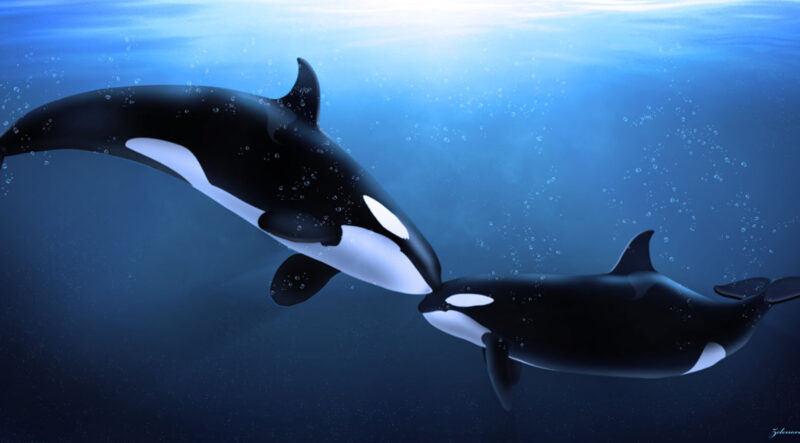Plenty of salmon for BC’s killer whales: study
No apparent shortage of salmon prey for southern resident killer whales in Canadian waters during summertime
By Fabian Dawson
SeaWestNews
Anti-salmon farm activists have long been trying to link the apparent lack of Chinook salmon prey for British Columbia’s resident killer whales to the region’s marine aquaculture operations.
But that theory, like many others trotted out by the activists, has been debunked by a new study led by scientists at the University of British Columbia.
In a paper published in the Canadian Journal of Fisheries and Aquatic Sciences, researchers report that the numbers of Chinook salmon in the Salish Sea in summertime are four to six times more abundant for southern resident killer whales than northern resident killer whales.
“People have been talking about a prey shortage as if it’s a fact, but this is the first study to quantify and compare the amount of their preferred prey, Chinook salmon, available to southern and northern resident killer whales,” said lead author Dr. Mei Sato, a research associate at the Institute for the Oceans and Fisheries at UBC at the time of the study, and now an assistant scientist at Woods Hole Oceanographic Institution.
For the study, the research team spent the summers of 2018 and 2019 surveying two areas known to be important foraging habitats for resident killer whales — the Johnstone Strait for northern residents and the Juan de Fuca Strait for southern residents — where killer whales intercept migrating Chinook salmon returning to the Salish Sea.
“Whenever something happens in our oceans even if it’s naturally occurring, the activists blame salmon farmers,” said an aquaculture industry official.
“For years now they have been blaming fish farmers for the apparent lack of Chinook in the whales feeding grounds…now this study shows there is plenty of salmon for the whales,” he said.
Over the past few years, groups like Orca Lab and Sea Shepherd have attempted to link the deaths and disappearance of the Southern Resident Killer Whales (SRKW) to open-net salmon farming on the B.C. coast.
Following the death of a baby whale in July of 2018, Paul Spong of OrcaLab issued a statement saying: “The explanation about the baby’s death has a lot to do with the depletion of chinook salmon…The presence of fish farms and viruses that they’re sharing has a lot to do with that.”
This same claim was made by the American eco-militant group Sea Shepherd in a press release.
The Pacific Salmon Foundation shot down Sea Shepherd’s claim calling it “unethical” for its attempt to link the death of the baby Orca whale to the BC fish farming industry.
The anti-fish farm activists, constantly refer to a contentious study that claims that the Piscine orthoreovirus (PRV) virus may cause disease in Chinook salmon, causing its decline.
The study has been savaged by a range of fisheries and aquaculture experts who said it was more about anti-fish farm activism than science.
Dr. Sato and co-author of the latest UBC study, Dr. Andrew Trites said in a statement “Now that there is evidence that southern residents are not facing a prey shortage in their traditional summer feeding areas in Canadian waters, the focus of further research efforts should be directed to other factors, areas and seasons.”
“We don’t really know about prey availability outside of the Salish Sea and outside the summer season. To answer the question of whether there’s an overall prey shortage, we still need to figure out what’s happening during winter and spring, whether there are significant fluctuations year-to-year and in the different locations these whales travel to, like California,” said Dr. Sato.
While the small southern resident population numbered 73 individuals as of October 2021, the increasing northern resident population numbers around 300. In recent years, southern residents have also been returning later than normal to the inside coastal waters of British Columbia and Washington.
“Our findings suggest that this food shortage is probably not occurring during the summertime when they have traditionally fed in the Salish Sea,” said the study authors, who collaborated with sport and commercial fisherman, the Sport Fishing Institute of British Columbia, and whale watching companies.
Efforts are currently underway on both sides of the border to boost the killer whale populations, which include increasing hatchery production of Chinook salmon, habitat restoration and sweeping closures of commercial and recreational fisheries around Vancouver Island.
“It is hoped that this study will allow the Department of Fisheries and Oceans to focus on measures and actions that will benefit Southern Resident Killer Whales to best extent possible rather than to ineffectively and unnecessarily restrict opportunity for boaters and anglers,” said the Sport Fishing Institute of British Columbia.
Main image: (Stock)
Image; A southern resident killer whale feeding on Chinook salmon returning to the Fraser River. Credit: A.W. Trites/University of British Columbia)

